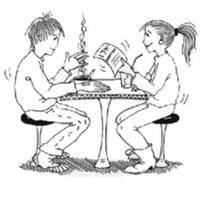Ĉapitro 4.1 – IJK-invitilo
|IJK|приглашение
Chapitre|IJK|
Kapitel 4.1 – IJK-Einladungsschreiben
Chapter 4.1 – IJK invitation letter
Capítulo 4.1 – Carta de invitación de IJK
4.1장 – IJK 초청장
Hoofdstuk 4.1 – Uitnodigingsbrief IJK
Capítulo 4.1 - Carta convite IJK
Глава 4.1 – Письмо-приглашение IJK
Розділ 4.1 – Лист-запрошення IJK
第 4.1 章 – IJK 邀請函
Chapitre 4.1 – Invitation IJK
En kafejo, post pluraj semajnoj (Kabe sukcesis lerni Esperanton, kaj ili nun uzas la lingvon.
Dans|café|après|plusieurs||(Kabe|a réussi|à apprendre|l'espéranto|et|ils|maintenant|utilisent|la|langue
In a cafe, after several weeks (Kabe managed to learn Esperanto, and they now use the language.
Dans un café, après plusieurs semaines (Kabe a réussi à apprendre l'espéranto, et ils utilisent maintenant la langue.
)
Ina: Jen, rigardu, invitilo por IJK!
|Voici|regarde|invitation|pour|IJK
) Female: Here, look, an invitation for IJK!
) Ina : Tiens, regarde, une invitation pour IJK !
Kabe: Kio, I-J-kio?
Kabe|Quoi||J|
Kabe: What, IJ-what?
Kabe : Quoi, I-J-koi ?
Ina: I-J-K estas ‘Internacia Junulara Kongreso'.
|||K|||молодежный|
|je|||est|‘Internationale|de la jeunesse|Congrès'
Female: IJK is an 'International Youth Congress'.
Ina: I-J-K est le ‘Congrès International de la Jeunesse'.
Mi planas iri al ĝi.
Je|prévois|d'aller|à|lui
I plan to go to it.
Je prévois d'y aller.
Ĉu ankaŭ vi volas iri?
Est-ce que|aussi|tu|veux|aller
Do you want to go too?
Veux-tu aussi y aller ?
Kabe: Nu… ‘kongreso' ne sonas tre interese.
Kabe|Eh bien|'congrès'|ne|sonne|très|intéressant
Kabe: Eh bien... ‘congrès' ne sonne pas très intéressant.
Ina: Sed estas!
|Mais|il y a
Female: But it is!
Ina: Mais si!
Ne pensu pri iu teda malvigla kongreso.
||||скучный|малоумный|
Ne||à|un|ennuyeux|mal éclairé|congrès
Don’t think of any boring sluggish convention.
Ne pense pas à une conférence ennuyeuse et terne.
Simple temas pri renkonto kun junuloj de multaj landoj.
|||||молодежью|||
Simple|parle|de|rencontre|avec|jeunes|de|nombreux|pays
It is simply a meeting with young people from many countries.
Il s'agit simplement d'une rencontre avec des jeunes de nombreux pays.
Verŝajne estos 300 ĝis 400 homoj tie, kaj preskaŭ ĉiuj parolos Esperanton.
probablement|il y aura|jusqu'à|personnes|là|et|presque|tous|parleront|l'espéranto
There will probably be 300 to 400 people there, and almost all of them will speak Esperanto.
Il y aura probablement entre 300 et 400 personnes là-bas, et presque tout le monde parlera espéranto.
Kabe: Bone, sed mi ne bone parolas Esperanton.
Kabe|D'accord|mais|je|ne|bien|parle|l'espéranto
Kabe : D'accord, mais je ne parle pas bien l'espéranto.
Ina: Ne gravas, eblas partopreni en Esperanto-kursoj tie.
|||возможно|участвовать|||курсы|
|Non|importe|il est possible|de participer|à||cours|là-bas
Female: No matter, it is possible to participate in Esperanto courses there.
Ina : Peu importe, il est possible de participer à des cours d'espéranto là-bas.
Kutime estas du niveloj, unu por komencantoj kaj alia por homoj, kiuj jam eklernis la lingvon.
обычно|||||||||||||выучили||
Habituellement|il y a|deux|niveaux|un|pour|débutants|et|un autre|pour|gens|qui|déjà|ont appris|la|langue
||||||||another|||||have learned||
There are usually two levels, one for beginners and another for people who have already started learning the language.
En général, il y a deux niveaux, un pour les débutants et un autre pour les personnes qui ont déjà appris la langue.
SENT_CWT:AFkKFwvL=3.05 PAR_TRANS:gpt-4o-mini=1.49
fr:AFkKFwvL
openai.2025-02-07
ai_request(all=19 err=0.00%) translation(all=15 err=0.00%) cwt(all=116 err=13.79%)

